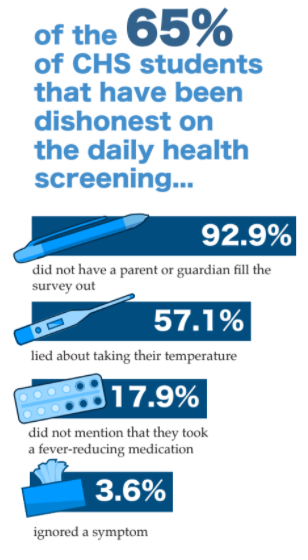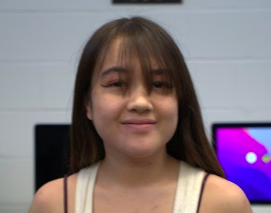Students discuss honesty on CHS’s health survey

BLOT GRAPHIC BY DANI McLAUGHLIN
Students explain dishonesty on the daily health screenings and why it may occur.
January 19, 2021
The MCVSD returned to partial in-person learning in October, and with the cautious re-opening after months of remote attendance came a plethora of precautionary measures taken to ensure the safety of students and staff.
One such safeguard was the “Traffic Light Survey,” a daily screening that determines whether a student may physically attend school based on potential COVID-19 related symptoms or recent exposures to the virus. After filling out the survey, which asks students if they have come in contact with a known case of the virus, if they have experienced any potential symptoms recently or if they have taken a fever-reducing medication recently, they will receive either a “green light,” allowing them to attend school physically, or a “red light,” meaning they will attend remotely for the day.
“My home high school, Allentown, has no screening process, not even a [temperature] check,” said senior Erin Burke of Allentown. “I would imagine that this is because their student body is roughly 5 times our population. Our student and faculty population lends itself to our ability to screen accurately in comparison to other institutions.”
The Traffic Light Survey relies heavily upon student honesty, as it is taken before entering the building and therefore there is no way for faculty to confirm or deny that the answers are entirely accurate prior to a student coming to school. In some cases, if a student were to answer dishonestly and come to school, it could pose a serious health risk.
“I answer [the survey questions] honestly, if I don’t feel sick I don’t take my temp,” Burke said. “I have only ever lied once and it was during allergy season when I had a slight sore throat and no other symptoms… I knew it was allergies because I have the same symptoms every year.”
Students who say they aren’t always truthful generally agree it is because they know their bodies better than the survey does. An anonymous sophomore corroborated this point, saying, “I have seasonal allergies, so I lie about the symptoms often. I know with almost 100% certainty that my symptoms are a result of allergies, and I don’t want to cause any concern by saying I have them. If there were a change in symptoms, or I felt I might be sick with something other than allergies, though, I would answer the question differently and not show up to school… I consider myself to be diligent about the rules and safety precautions, but I won’t spark worry when there’s no reason for it.”
While some students commented that they don’t take their temperatures if they feel they don’t have to or will
sometimes lie about symptoms, others said that they treat the survey and their answers with much more severity.
“I don’t think I’ve lied about anything on there. I usually do take my temperature each morning since my family’s at high risk for COVID so I try to do whatever I can to stay safe,” said sophomore Quinn Bender of Holmdel. “I think it’s a pretty accurate and efficient way to screen students as long as they’re 100% honest with the questions.”
Many students understand the responsibility of answering the survey accurately for the sake of the health of those in the building and answer the questions as precisely as possible to an extent.
“I would say most people are truthful,” Burke observed. “I don’t know of anyone who actually checks their temp before they leave the house, and some people will lie about the fever-reducing medication because we all take ibuprofen for reasons that could potentially get us denied, like chronic pain that presents as soreness or aches.”
The Traffic Light Survey is simply another way to protect those at CHS in the time of COVID-19.
“Almost any way to monitor or screen a student relies on their honesty, just like this survey,” said sophomore Amanda Riordan of Manasquan. “I care more about the health of my peers than my attendance to school. If I felt sick, I would not show up. I choose to believe that most of my peers live under this philosophy as well.”




